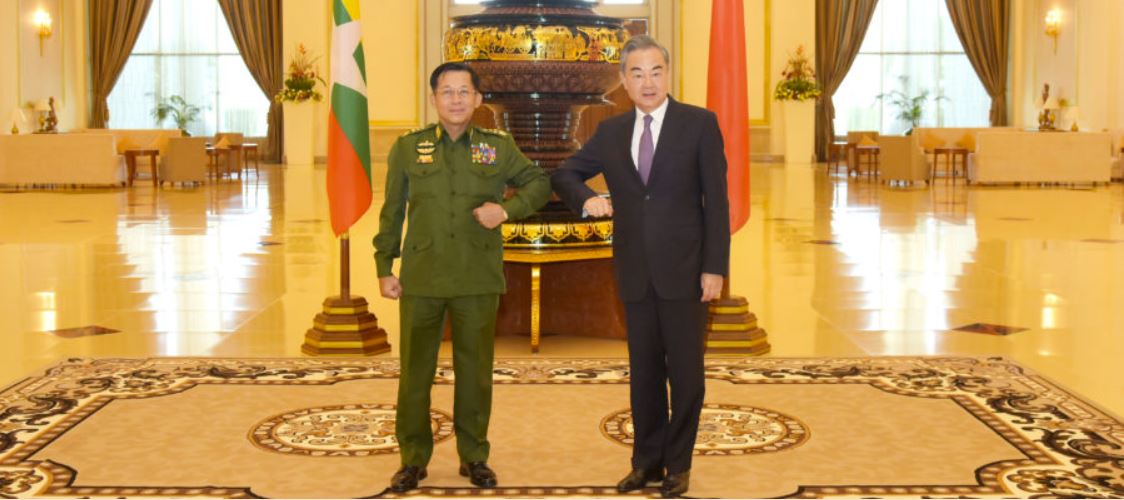The military coup in Myanmar on February 1, 2021, marked the reestablishment of the authoritarian regime. The Tatmadaw – Myanmar’s military – detained President Win Myint, State Counsellor Aung San Suu Kyi, and the elected members of the National League for Democracy, the ruling party. The United States immediately expressed “deep concern” for the current military takeover and has announced that the coup was a “direct assault on Burma’s transition to democracy and the rule of law.” China on the other hand stayed silent and refrained from criticizing the military coup in Myanmar. The potential economic benefits for China and the positive relations with the Tatmadaw could be pinpointed as the reason for Beijing’s silence amidst the military coup in Myanmar.
Myanmar, the Stage for China’s Belt and Road Initiative
As Myanmar’s top trading partner, China has maintained positive relations with Myanmar’s military regime since 1988 due to the country’s strategic geographical location. Bordering China to the north and the Bay of Bengal to the south, Myanmar’s strategic location helps China’s Belt and Road Initiative (BRI) for an efficient transportation of oil and gas reserves to China from the Middle East, thus supports the BRI to advance. Since 2010, China began building oil and natural gas pipelines from Myanmar’s deep-water port of Kyaukphyu in the Bay of Bengal to Kunming in Yunnan province of China. As the world’s top oil buyer, China has bought a record average of 10.8 million barrels per day in 2020. Currently, most of its oil imports are brought through the Malacca Strait, which has a dominant United States presence. Therefore, the guarantee of safe transportation of oil reserves through Myanmar can be one explanation for the sedulous action of China to maintain positive ties with the military junta of Myanmar.
The current economic sanctions imposed on the military regime by the United States and the European Union will only bring benefits to China. With no states to turn to for economic support, the military junta will increase its reliance on China for foreign investment. For example, if reliance on China increases, Myanmar is more likely to increase the cost of the deep-sea port construction in Kyaukphyu from $1.3 billion to $7.3 billion, a project supported by China International Trust and Investment Corporation (CITIC). The original cost of $7.3 billion was cut to $1.3 billion in 2018 by Aung San Suu Kyi’s National League for Democracy after concerns that Myanmar would be unable repay the debt. If sanctions continue and the military junta maintains power, China will have better grounds to push for a $7.3 billion budget. This might result in the similar situation as the Hambantota Port in Sri Lanka, in which the Sri Lankan government was forced to sign a 99-year lease of the port to China due to the Sri Lankan government failing to repay the debts owed to the Chinese companies.
Myanmar’s Democratization Threatens the Tatmadaw and China
After former dictator Than Shwe left Myanmar in 2011, the United States formally eased its economic sanctions on Myanmar in support of the country’s democratic transition, which was led by Daw Aung San Suu Kyi and the National League for Democracy party. However, in fear of the military junta gaining more power, the United States decided to continue to restrict foreign investments into the military-affiliated economic entities. During the democratization period of Myanmar from 2011 to 2021, Western foreign investment increased, and Myanmar began balancing foreign investment between China and the West. China had been the only dominant foreign investor in Myanmar before 2011, but competition against the foreign investments of Western countries was unavoidable. The decline of China’s dominant presence in Myanmar and the continued economic sanction on the military’s economic assets led to opposition to the democratic movement of Myanmar by Beijing and Tatmadaw.
China’s foreign minister, Wang Yi, visited Myanmar in January 2021 to meet General Min Aung Hlaing and Daw Aung San Suu Kyi. In a one-to-one meeting between Minister Wang Yi and General Min Aung Hlaing, General Min Aung Hlaing said that he will “continuously support China’s stance on issues related to Taiwan, Hong Kong, and Xinjiang” and that “China is a good friend of Myanmar forever.” The pro-Chinese sentiment of General Min Aung Hlaing will lead to the increase of economic reliance on China and benefit the military and China if the military coup succeeds. As one of two parties that does not want any further democratization of Myanmar, China has decided to send an unspoken message of support for the military coup of Myanmar.
The Future of Myanmar
The military junta is solidifying its position in Myanmar through violent crackdowns on peaceful protesters. The United Nations lacks action as the United Nations Security Council has failed to condemn the military coup due to the veto from China and Russia. The success of the military coup will ultimately benefit China in the long term. As an authoritarian regime itself, China hopes to gain an ally as a common enemy against the United States. For this very reason, since the military junta regime promises potential benefits and positive relationships with its government, China is staying silent amid the violent power transition in Myanmar.
Su A Cho is a junior majoring in Global Affairs with a concentration in Global Governance at George Mason University Campus. He is currently serving as a research assistant at the Center for Security Policy Studies – Korea. His research interest focuses on international security policies in Southeast Asia and East Asia, human security in developing nations, and the democratization of Myanmar.




